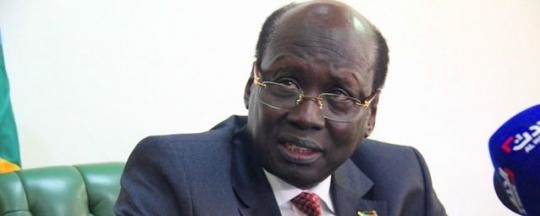The government broadcasting service in South Sudan tonight described President Salva Kiir’s speech about the failed peace talks as conciliatory. SSTV reported that the government does not want to take the country back to war.
In a long speech at a party rally today, Kiir explained why he rejected an IGAD compromise proposal that would have given the SPLM-IO rebel group a share of power in the government. It was his first major public address since his return from negotiations in Addis Ababa earlier this month. Sources had told Radio Tamazuj that officials close to Kiir were concerned about possible public reaction to the speech, given anti-war sentiments in the capital.
Tonight on the state-run television SSTV, host Garang John opened an interview with Foreign Minister Barnaba Marial by describing the speech as “conciliatory and diplomatic.”
The foreign minister agreed with this assessment and also stressed that international threats of sanctions for obstruction of the peace process are not helpful and will not work. “So that is not the solution,” said Barnaba.
Referring to the United States, one of several powers to have threatened sanctions, the foreign minister said he expected diplomatic relations to continue in spite of disagreement over the issues of sanctions. “Even people within one family can differ, and on this issue of sanctions this is where we have differed with the United States of America,” he noted.
Barnaba was also questioned as to whether the speech was conciliatory toward opposition forces and whether the government had been sufficiently compromising at the peace talks. He defended the government position saying it had offered enough concessions.
In another report, an SSTV reporter speaking at the grounds of the rally today said, “The government of South Sudan is still committed to lasting peace, calling on those who rebelled to lay down arms and come back for lasting peace.”
Related:
South Sudan’s president responds to sanctions threat: Bring it on (18 March)
South Sudan lobbying for regional support against sanctions (16 March)
Kiir postpones first public address after failed peace talks (13 March)




